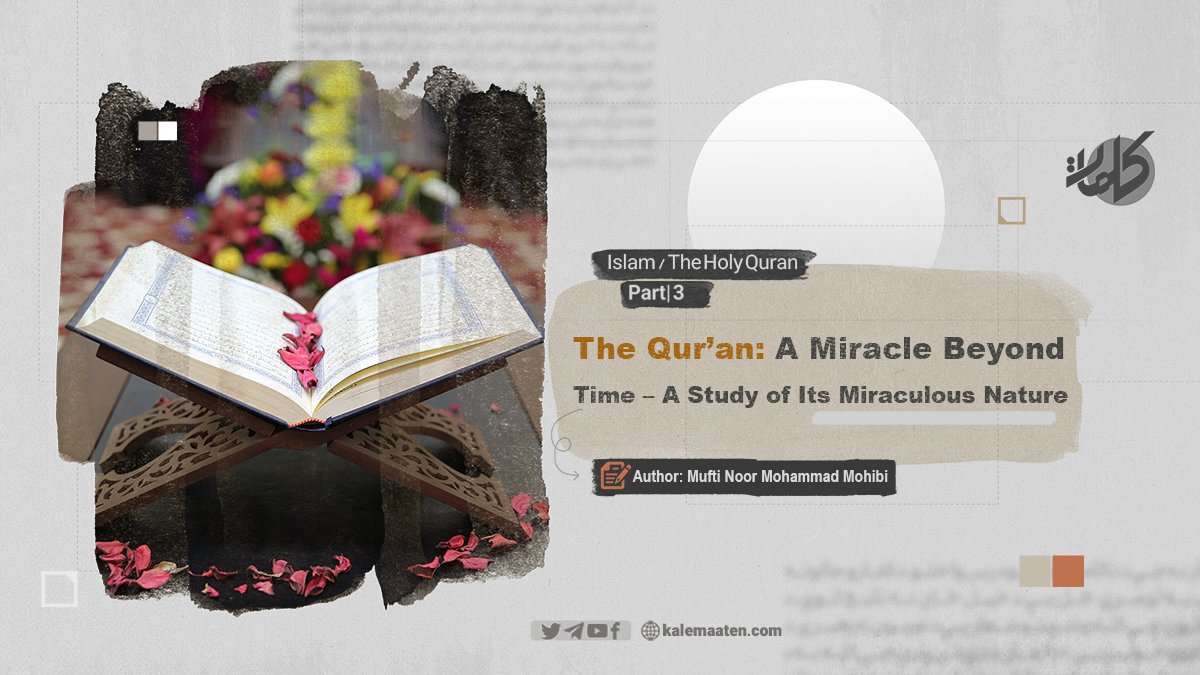Author: Mufti Noor Mohammad Mohibi
The Qur’an: A Miracle Beyond Time- A Study of Its Miraculous Nature (Part Three)
Definition of a Miracle
Throughout the history of divinely revealed religions, one of the main issues faced by the people was the verification of the truthfulness of prophets (peace be upon them). To address this challenge, Allah, Glorious is His Majesty, equipped His messengers with evidence and signs, among the most significant of which is the miracle. In Islamic theology (kalam), the discussion of miracles holds a very important place, especially in the science of creeds (‘aqeedah), where the proof of prophet hood is fundamentally based on the occurrence of miracles.
This section explores in detail the definition of miracles, their characteristics, how they differ from karamat (saintly wonders), magic, and other supernatural phenomena, along with supporting evidence from the Qur’an and Hadith.
1. Linguistic and Terminological Meanings of Mu‘jizah (Miracle)
a. Linguistic Meaning
In the Arabic language, mu ‘jizah derives from the root word ‘-j-z, which means “inability” or “incapacity.” Thus, a mu ‘jizah is something that others are incapable or powerless to do.
b. Terminological Definition
In the terminology of Islamic theology (‘ilm al-kalam), a miracle is defined as:
“أمر خارق للعادة، مقرون بالتحدي، سالم عن المعارضة.”
Translation: “An extraordinary event that defies the natural order, accompanied by a challenge, and free from any counteraction.” [1]
2. Pillars and Conditions of a Miracle
Scholars have outlined several conditions that must be met to distinguish a mu‘jizah from other supernatural acts. If any of these conditions are absent, the act cannot be classified as a miracle:
1.Inimitability
No one must be able to produce anything similar. Examples include the splitting of the Nile by Prophet Musa (PBUH), the splitting of the moon by Prophet Muhammad (PBUH), and the resurrection of the dead by Prophet ‘Isa (PBUH).
2.Supernatural Nature
A miracle must transcend human ability and natural laws — such as the emergence of the she-camel of Prophet Salih (PBUH) from a solid rock, or water gushing forth from the blessed fingers of the Prophet Muhammad (PBUH).
3.Conformity with the Claim of Prophet hood
The miracle must confirm the truth of the prophetic claim. It must occur in accordance with what the prophet has declared. If it occurs in contradiction to his claim, not only would it not count as a miracle, it would be a sign of falsehood. For example, it is narrated in the books of sīrah that Musaylimah the Liar, in an attempt to increase the water in a well, spat into it — but by Allah’s will, the well dried up instead. This supernatural act discredited rather than validated him.
4.Accompanied by Challenge
The Prophet challenges others to produce something similar. “فَأْتُوا بِسُورَةٍ مِّن مِّثْلِهِ” [2]
3. Difference Between Miracle, Karamah, and Magic
a. Difference with Karamah
✓ Karamah is a supernatural event that occurs through a saint (wali) without any claim to prophet hood. Its purpose is to honor the servant and strengthen faith, not to establish prophet hood. “ولكن كثير من المتأخرين يفرقون في اللفظ بينهما، فيجعلون المعجزة للنبي، والكرامة للولي.” [3]
✓ A miracle involves challenge (tahaddi), whereas karamah appears under specific personal conditions and without a challenge. “لأن الكرامة عبارة عما يظهر من غير اقتران التحدي به، فإن كان مع التحدي فإنا نسميه معجزة.” [4]
b. Difference with Magic
Magic is a deceptive and illusory act carried out with the help of devils and hidden forces. A miracle, on the other hand, is from Allah and is always aligned with the truth. Therefore:
1.A miracle is not a science, while magic is.
2.A miracle is a divine gift (wahbi), while magic is acquired (kasbi) — it follows a set of learnable rules and methods that can yield strange results when applied. A miracle is not subject to such acquisition. [5]
4. Examples of Prophets’ Miracles in the Qur’an
Miracles of Previous Prophets (peace be upon them):
•Musa (PBUH): His staff turning into a serpent, the splitting of the sea, etc.
•‘Isa (PBUH): Reviving the dead, healing those born blind, etc.
•Salih (PBUH): The emergence of the she-camel from solid rock.
Miracles of the Prophet of Islam (PBUH):
•The Noble Qur’an: The greatest and eternal miracle.
“وَإِنْ كُنْتُمْ فِي رَيْبٍ مِمَّا نَزَّلْنَا عَلَى عَبْدِنَا فَأْتُوا بِسُورَةٍ مِنْ مِثْلِهِ وَادْعُوا شُهَدَاءَكُمْ مِنْ دُونِ اللَّهِ إِنْ كُنْتُمْ صَادِقِينَ” [Al-Baqarah: 23]
•The Splitting of the Moon
“اقْتَرَبَتِ السَّاعَةُ وَانْشَقَّ الْقَمَرُ” [Al-Qamar: 1]
•Other examples: Blessing of food, speech of stones and trees, and hundreds of other signs.
Continues…
Previous Part/ Next Part
[1] Sharh al-Maqasid fi ‘Ilm al-Kalam (2/176)
[2] A summary of (al-‘Irfan fi ‘Ulum al-Qur’an: 50-53)
[3] Sharh al-Tahawiyyah – published by Al-Awqaf Saudi Arabia p: 507
[4] Al-Iqtisad fi al-I’tiqad by al-Ghazali p: 107
[5] Taken from (al-‘Irfan fi ‘Ulum al-Qur’an: 54)



